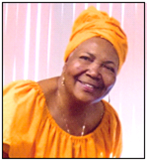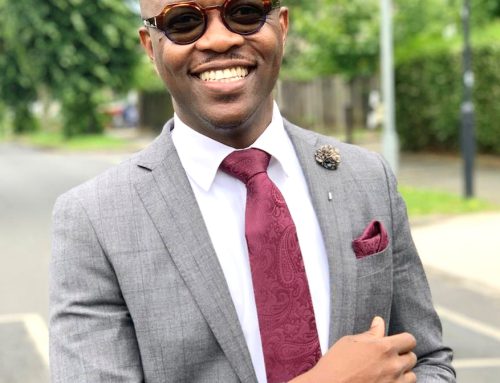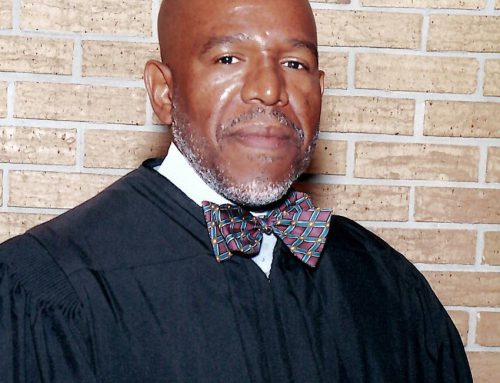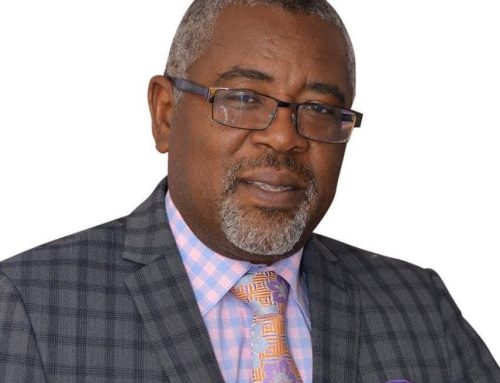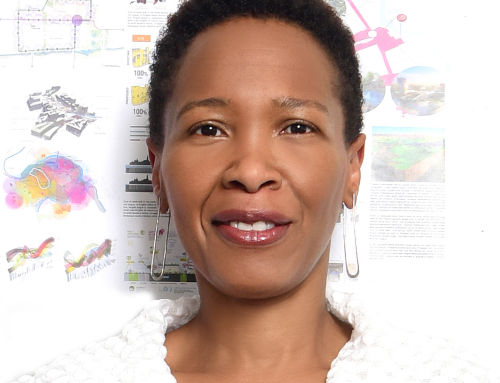Norma Darby – Spreading Warmth Of Jamaican Culture In Florida
Louise Bennett-Coverley is buried in Jamaica’s National Heroes Park, but ‘Miss Lou’ lives on in Florida. Her life’s work is vibrantly showcased by the Jamaican Folk Revue and the Louise Bennett-Coverley Heritage Council– thanks to Jamaica-born Norma Darby.
Darby founded the Folk Revue in the 1990s after attending the Miami International Folk Festival, which featured cuisine, music, songs and dances from around the world. Jamaica’s only representation consisted of the island’s food and beverages.
“I observed other countries showing off their cultural heritage,” Mrs Darby says. “And I thought, Jamaica has a wonderful culture, why not put it on display, too?” She decided to form a representative group from the Association members, to perform Jamaica’s traditional songs and dances at the folk festival. She set out to collect folk songs from the Jamaican community in South Florida – and discovered talented performers from the process.
She and her husband had joined the Jamaica Association of Florida to meet other Jamaicans when they moved to Miami in 1973. So, she enlisted members of that group to help put the show together.
At the time, her husband Percival (“Val”) was a professor at Florida International University, and she had trained as a medical technologist. But they shared a passion for the stage.
“We met in 1957 during a production of “Sunday Cost Five Pesos by my church’s theatre group,” Darby recalls. “He was a budding comedian and singer who played the lead role of Woody Mahoney in the LTM’s Pantomime production of “Finian’s Rainbow”. Even when he forgot his lines, his ad libs were hilarious.”
Darby recalls that it was the proverbs, songs and dances they collected that made her fully appreciate the appeal of her native culture. Growing up in Jamaica, she had been taught to emulate British culture and to shun Jamaican folklore and Patois. At the private school she attended, she learned folk dances and songs from the British Isles, not Jamaica. “They had us dancing Scottish reels,” Darby said, breaking into incredulous laughter. “Imagine!” Now, she is a passionate advocate for Jamaica’s cultural heritage
How did you get involved with music, dancing and folklore?
I think it was always in my blood- just repressed by my traditional, “quasi-British”, school -teacher dominated, upbringing. Migrating to America, gave me the cultural freedom that I had unknowingly craved; and my cultural spirit/ instincts “get ‘wey broad” (if my Mother could have seen me , she would have been sorely saddened – I think). However, I had my cultural “epiphany”, when I had the privilege and opportunity of accompanying my husband to Negril, the tourist mecca located between Hanover and Westmoreland. Our sojourn in Negril, where he managed the Poinciana Hotel, was my most beneficial one and I had the opportunity of developing the cultural “Anancy Theme Park”, complete with Historical, Cultural (complete with a “ba’becue”, a “jam-a-corner” (bamboo framed bed, nailed to the wall) and Art Museums, that showcased the varied and multiple genres that comprised all aspects of our Jamaican culture.
I had the chance to delve into our “grass roots” culture, attending Dinki Minis, “ni-nights”, visiting the Ettu of Hanover, where they spoke a pure version of Twi, the W. African dialect of our early enslaved ancestors. Learning about Poco, Goombeh in St. Elizabeth (even acquired a goombeh drum) Nago, from the grass-root level, and even being invited to be a guest judge in the JCDC’s All-Island Cultural Competitions. That was perhaps, the greatest epiphany in my cultural journey and I was absolutely filled with awe at the depth, beauty and overwhelming and undervalued importance of our African heritage/roots.
“Old time Jamaican culture is the repository of the history of the Jamaican people, defining who we are,” she says. “It is the legacy and cultural identities of our African, Asian and European forefathers, which makes our culture so unique.”
The wave of enthusiasm that greeted the Folk Revue’s first show surprised her. “We were the ‘poster child’ of the folk festival–winning the coveted prize (and cheque) for the best cultural display,” she said. Invitations from various festivals poured in after that. And the Jamaican Folk Revue has been going strong ever since.
From the beginning, their concerts included Miss Lou’s poems, but they were not the main attraction. “We were more into the music (my first love) and dance,” Darby said. “But then I met Louise Bennett-Coverley in person – she was living in South Florida during the 1980s. She and Lois Kelly Barrow were the guest performers in one of our concerts, and we worked together on the Sister City Program, twinning Coconut Grove and Port Antonio, when she hilariously exclaimed “Lawd me chile, me face feel like Courthouse Bible”. “I fell in love with our culture and I thank Miss Lou, who is my personal National Hero.”
After Miss Lou died in Canada in 2006, Darby started the Louise Bennett-Coverley Reading Festival in to keep the Jamaican icon’s legacy alive. “The event explores the immense influence her works have had on Jamaicans at home and in the diaspora,” she said. “Miss Lou has influenced individuals across the world. People started to realize that what we Jamaicans have – our culture – is nothing to be ashamed of. It is what makes us unique and successful in all our endeavors”.
“And she showed others that Jamaican heritage stems from a myriad of histories and cultures like Scottish, British, African, Portuguese, Asian and others. To quote Miss Lou, ‘When de Asian and European cultures buck up ‘pon de African culture in the Caribbean people, we stir dem up and blend dem to wi flavour, we shake dem up and move dem to wi beat; we wheel dem and we tun dem, and we rock dem and we sound dem an’ we tempo dem an’, lawks de rhythm sweet.’”
The 10th anniversary of the festival, held in partnership with the Friends of the South Regional Broward Library, featured the launch of the Louise Bennett-Coverley Heritage Council. “The council provides a wider scope to address different aspects of our Jamaican culture –inviting our eminent culture keepers, writers, storytellers, musicians, professors, dancers, proponents of the theatre arts – to share their knowledge, stories and experiences with Miss Lou and create a repository where others can come for information,” Darby said.
The council offers one-year scholarships to both the Edna Manley College in Jamaica and the Broward College in South Florida. So far, more than 30 students of the performing arts have received scholarships, and recently, the council, in partnership with the XLCR Alumni Association, has adopted the Louise Bennett-Coverley All-Age School in Gordon Town (Miss Lou’s alma mater).
Jamaica’s heritage is being kept alive in America’s schoolrooms, as well as on the stage. In 1980, Darby was asked by Miami’s Channel 2 to do a TV programme on Jamaica, and the script, Heritage, written by the late Gloria Lannaman and choreographed by the late Shirley Campbell, has been featured in educational TV specials and in schoolrooms across America.
For three consecutive years, she produced the Louise Bennett-Coverley Community Concerts, showcasing local talent. And in 2009, she produced a fund-raiser called ‘The Hon. Miss Lou’. At the fund-raiser, she officially handed over the reins of the Folk Revue to Colin Smith (of the Tallawah Mento Band) in order to concentrate more fully on the Louise Bennett-Coverley Reading Festivals.
In 2011, she co-wrote and produced the pantomime, Ol’ Time Sinting, as a tribute to Miss Lou (under the guidance of well-known writer and folklorist, Easton Lee, (with guests Leonie Forbes and Volier Johnson, Bennett-Coverley’s early protégés,).
In designing and making the costumes for her folk group, Darby learned to sew, and that led to development of a fashion line, ‘Anansi Creations’ (featured in a Miami magazine). She coined a word “Jamacentric” to describe the designs as “everyday clothing that utilized the bandanna material for classic fashions .”
Norma Darby (nee Wright) was born and grew up in Kingston. She first visited America in 1967 to study cardiovascular techniques in connection with her work as senior technician for the Cardiovascular Laboratory at The University Hospital of the West Indies. She returned later to join her husband, who was a student at Cornell University in Ithaca, New York.
With her husband and their two children, she made their permanent home in the US, where she studied music (her first love) at Florida International University.
Her husband’s career involved travelling to various countries (one assignment took them to China where she also taught and orchestrated a cultural exchange – Chinese Folk songs and proverbs, for Jamaican ones ) and he was part of the management team that opened Disney World .
Darby recalls experiencing a cultural “epiphany” when they later went to Negril, where he managed the Poinciana Hotel.
“I was absolutely filled with awe at the depth and beauty – and of the overwhelming and undervalued importance of our African heritage.”
Because of health issues, Darby recently surrendered the Louise Bennett-Coverley Heritage Council’s reins to Colin Smith and Valrie Simpson, and retired to Kissimmee, Florida. But she is still engaged in guiding its activities and promoting Caribbean culture – forming a cultural exchange group, as an activity of a local Caribbean-American social club, to share the community’s cultural diversity with her new neighbours. So far, they have had enthusiastically received presentations from Jamaica, Trinidad, Guyana and Tobago, with samples of the cuisine, music, dance and folktales of the Caribbean /S. American countries.
She and club members travelled to West Palm Beach to attend the Miss Lou 100 Birthday celebration, presented by the Louise Bennett-Coverley Heritage Council and featuring the Jamaican Folk Singers in Concert, with comedienne Joan Andrea Hutchinson.
Miss Lou’s example helps to keep her going, Darby explains. “Louise Bennett and her husband moved to Fort Lauderdale early in the 1980s, and to Toronto in 1987, but they kept their Jamaican cultural identity. Miss Lou said, “Any which part mi live –Toronto-o! London-o! Florida-o! – a Jamaica mi deh!” “I have adopted this quotation as my mantra, and my mission, ‘edutainment’– educating through entertainment –sharing the magnificent culture that is our heritage. Thanks, in large part, to Louise Bennett-Coverley.” – Norma Darby

